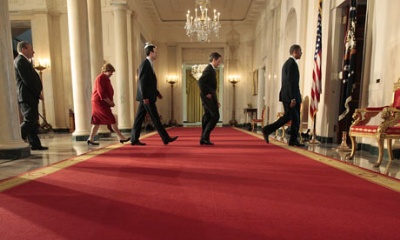
Barack Obama sought to take his beleaguered presidency back to the middle of US politics at the launch of his 2011 budget today by telling the American people it was time to live within their means once again and stop treating the dollar as though it were Monopoly money.
Unveiling a budget proposal that would see spending rise to $3.8tn (£2.3tn), pushing this year's federal deficit to a historic high of $1.6tn, Obama held out the prospect of an injection of resources into schools, green energy and the two continuing wars.
But he also began to wield the knife, severing his ties to the Kennedy-era aspiration of space travel by cancelling plans to put astronauts back on the moon by 2020 and playing down battered plans for health reform.
At a press conference to launch the budget, Obama said: "We simply cannot continue to spend as if the deficits do not have consequences; as if the tax dollars of the American people can be treated like Monopoly money; as if we can ignore the problem for another generation. We can't. It's time to live within our means once again."
In a written statement accompanying the budget, Obama emphasised the point. "We must recognize that the era of irresponsibility in Washington must end. In the long term, we cannot have sustainable and durable economic growth without getting our fiscal house in order."
But the president was accused of turning his back on five decades of American superiority in space by pulling the plug on plans to send astronauts back to the moon. The president's budget request to Congress lacked the funds to sustain Nasa's $81bn Constellation programme, the spaceships and rockets designed to put humans back on the lunar surface by 2020. Instead, the proposal added $6bn to Nasa's budget over the next five years for "the building blocks of a more capable approach to space exploration" – including commercial partnerships to send astronauts into orbit aboard privately developed space "taxis".
Seeking to put the battles over health reform behind him, Obama said spending on schools would rise by up to $4bn to $29bn.
Energy would be another winner at a time when Obama is seeking to create more jobs to ease the pain of 10% unemployment. The energy department's budget would rise by about 7% – almost $2bn – through incentives for the development of renewable energy and nuclear power plants, with extra cash going to encourage research in cutting-edge technologies.
The Obama administration is seeking to assuage some of the rightwing anger about record spending and deficit levels by presenting the budget as a moderate package that is neither left nor right.
To underline his fiscally responsible credentials, he emphasised a three-year freeze on domestic spending that would save $250bn, and cuts to about 120 federal programmes.
But if Obama hoped that by stressing budget discipline he would begin to draw Republicans back into the bipartisan fold, the reaction of party leaders suggested otherwise. Michael Steele, chairman of the Republican National Committee, criticised the budget as yet more "binge spending" that would set the stage "for the type of economic stagnation we haven't seen since the days of Jimmy Carter". A conservative thinktank, the Heritage Foundation, said Obama's strategy would see deficit spending rise by up to $2tn over the next decade above the level set last year. "It's absolutely critical that Obama achieves a fiscally-responsible budget, yet what we are seeing are minute reductions that are hardly the sea-change that is needed," said Alison Fraser, the foundation's head of economic policy studies.
Against the backdrop of conservative criticism, the White House is gambling on economic conditions swinging in its favour in the short and medium term. It hopes that another tranche of stimulus money – $100bn in the form of a jobs bill including tax cuts for small businesses – will begin to bring down the unemployment figures in time for the mid-term elections in November. That extra spending is partially offset by tax increases on wealthier families, new fees on banks and hedge-fund investors and a removal of tax breaks for oil companies.
In the medium term, the administration is gambling that, over the next three years, the country's overall economic performance will improve sufficiently to bring greater federal income through taxes and lower outgoings through falling unemployment benefits. To pave the way for bringing the deficit back under control, the administration is setting up a bi-partisan debt commission of experts to advise on cost-cutting measures.
In policy terms, the switch from health to education leaps out. In the wake of the Massachusetts defeat last month, in which the Democrats lost their filibuster-proof 60 seats in the Senate, health reform has become a symbol of the administration's paralysis at the hands of a partisan Congress.
By contrast, the administration's ideas for education reform have attracted widespread support from across the political spectrum. The education secretary, Arne Duncan, has embarked on a nationwide tour to publicise the reforms with an unlikely bedfellow: the former Republican leader and architect of the 1990s Contract with America, Newt Gingrich.
Highly unusually, the extra money for schools earmarked in the budget has been tied specifically to the passage of legislative changes to George Bush's widely criticised No Child Left Behind policy. Unless those reforms pass through Congress, the money will not be forthcoming - presenting congressional leaders with a clear challenge to break the partisan deadlock.
Russ Whitehurst, an education expert at the Brookings Institute, said education had always been high on the agenda for Obama.
"The administration is pushing education up the agenda as they see an opportunity here for bipartisan action, for getting something done," he said.














